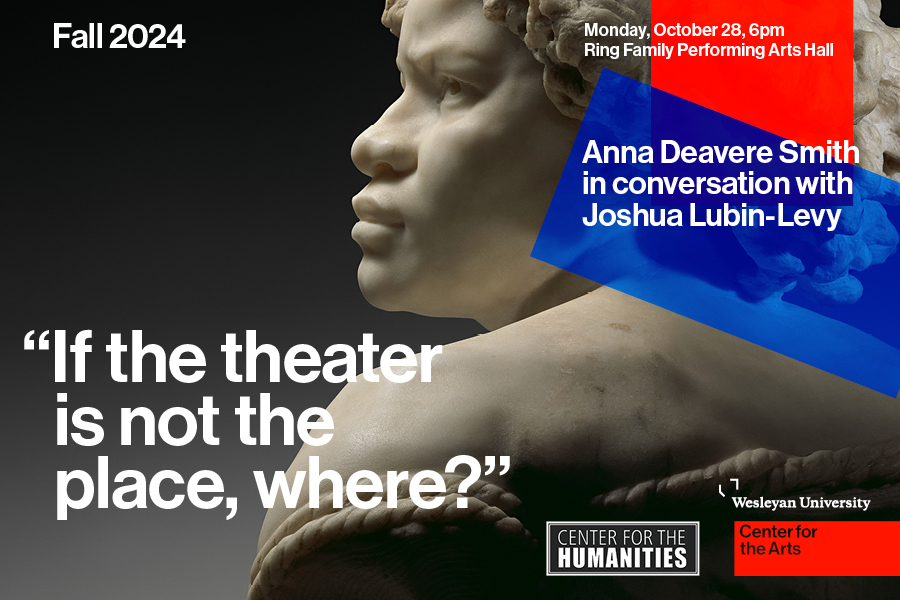
Anna Deavere Smith in conversation with Joshua Lubin-Levy: “If the theater is not the place, where?”
Monday, October 28, 2024 at 6:00pm
Ring Family Performing Arts Hall
Free admission.
Anna Deavere Smith, the 2024–2025 Artist in Residence at Wesleyan University’s Center for the Arts (CFA), will be in conversation with Joshua Lubin-Levy ’06, Director of the CFA. Their conversation “If the theater is not the place, where?” will be followed by a Q&A with the audience. Presented as part of the Wesleyan Center for the Humanities fall Monday Night Lecture Series “Dead Reckonings.”
Read Anna Deavere Smith Hon. ’97 Starts Yearlong Artist Residency with Staged Reading of New Work in The Wesleyan Connection.
In her newest play, This Ghost of Slavery, Anna Deavere Smith combines her well-known documentary theater method with archival research on the late-1800s. More than examining the contemporary, this new work asks how history is alive in the present and the role the theater can play in bringing audiences to a point of engagement with the deep roots that shape the present. This Ghost of Slavery examines the roots of contemporary beliefs about the civilizing mission of education in post-emancipation policies that reinforced racist ideologies and practices deeply entwined with colonialism. In this conversation at Wesleyan, she will unpack this current research project, its connection to her long-running investigation of the “school-to-prison pipeline,” and consider the function the contemporary American theater can play when it comes to artifacts of history that, while crucial for an understanding of the present, are so unsightly one might be reluctant to bring them forward.
Anna Deavere Smith is a University Professor at New York University. President Obama awarded her the National Humanities Medal (2012), and she was named the Jefferson Lecturer by the National Endowment for the Humanities (2015). She is a recipient of the Dorothy and Lillian Gish Prize for achievement in the arts (2013), the Ridenhour Courage Prize, and the George Polk Career Award in Journalism (both 2017). Smith has been nominated for the Pulitzer Prize for Drama and for two Tony Awards. She is the recipient honorary doctorates from the University of Oxford, Spelman College, Yale University, Harvard University, and the Juilliard School (among others). Smith has created over fifteen one-person shows based on hundreds of interviews. Her play Twilight: Los Angeles (1992) was recently named one of the best plays of the last 25 years by The New York Times. She has appeared on the television shows Black-ish, For the People, Nurse Jackie, Inventing Anna, and The West Wing; and her films include The American President, Philadelphia, and Rachel Getting Married.
About the Center for the Humanities Monday Night Lecture Series
A reckoning is an act of accounting or a call to account for conduct or actions past or present. It punctuates the ongoing transactions of everyday life with a collective adjudication that seeks to balance a ledger–if not the scales of justice–by holding to account. Whether this account is conceived as a single “day of reckoning” or an ongoing recalculation of indebtedness and/or injustice, it often tallies time, as well as value, as (ac)countable. This theme queries such notions of accountability by asking: with what methods, from what vantage, in what time or place, may the incalculable losses and gains wrought by the histories of slavery, genocide, settler colonialism, capitalism, and environmental devastation, be reckoned? What theoretical paradigms would afford such a pondering of the imponderable? What forms of reckoning–racial, religious, psychic, political, archival, aesthetic, economic, environmental, legal, linguistic–will call the present moment to account? What kind of “dead reckoning” and/or reckoning of death would these navigations steer toward? And what forms of death would the tally take into account–whose losses would be mourned? In this mourning time, what forms of temporality and spatiality would be reckoned, or themselves mourned as reckless or unreckonable or irrecoverable, and how? What miscalculations would be revealed, and in which archives of loss, or lost archives? This theme asks what the work of mourning might look like, what forms it may take, and what temporalities past, present, or future it might imagine in times of reckless and unreckonable reckonings.
RELATED EVENTS
Anna Deavere Smith: This Ghost of Slavery
Sunday, October 27, 2024 at 3pm
Crowell Concert Hall
$20 general public; $15 senior citizens, Wesleyan faculty/staff/alumni, non-Wesleyan students; $8 Wesleyan students, youth under 18.
Renowned playwright, actor, and educator Anna Deavere Smith, the Center for the Arts artist in residence for 2024–2025, presents a staged reading of This Ghost of Slavery: A Play of Past and Present, which was published in The Atlantic in 2023. Co-produced with the Long Wharf Theatre. Co-sponsored by Wesleyan’s Center for the Humanities. Presented as part of the University initiative Democracy 2024 (www.wesleyan.edu/d2024).
Long Wharf Theatre Artistic Congress Keynote Conversation: Anna Deavere Smith with Dr. Khalilah Brown-Dean
Saturday, October 26, 2024 at 7:30pm
Yale University Art Gallery, 1111 Chapel Street, New Haven, Connecticut
Pay what you can.
The Long Wharf Theatre’s Artistic Congress will feature an extraordinary Keynote Conversation with the acclaimed Anna Deavere Smith, the 2024–2025 Artist in Residence at Wesleyan University's Center for the Arts, and Dr. Khalilah Brown-Dean, Wesleyan’s Rob Rosenthal Distinguished Professor of Civic Engagement and Executive Director of the Allbritton Center for the Study of Public Life, and renowned host of CT Public’s “Disrupted.”